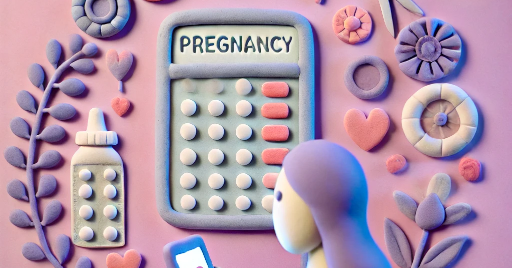Transitioning from birth control to planning a pregnancy can be both exciting and nerve-wracking. As a fertility specialist, I’ve helped many women navigate this journey, and I’m here to guide you through understanding your fertility after stopping birth control. This article will provide you with valuable insights and practical advice, helping you calculate your chances of conceiving.
Understanding Birth Control and Fertility
How Birth Control Methods Work
Birth control methods are designed to prevent pregnancy in different ways. Hormonal methods, such as the pill, patch, and injection, work by inhibiting ovulation, thickening cervical mucus, and thinning the uterine lining. Barrier methods like condoms prevent sperm from reaching the egg, while intrauterine devices (IUDs) either release hormones or create an environment that’s inhospitable to sperm.
Common Misconceptions
A common misconception is that birth control has long-term negative effects on fertility. However, most women find that their fertility returns to normal soon after stopping birth control. The key is to understand how each method affects your body and how long it may take for your cycle to regulate.
If you want to see how you age and intercourse frequency effects your pregnancy chances after stopping birth control, try our free Pregnancy Chance Calculator!
Try out our free advanced calculator as well! It has more inputs so we can produce a more accurate result!
How Birth Control Affects Your Cycle
Returning to Normal Cycles
When you stop using hormonal birth control, your body needs time to resume its natural menstrual cycle. For some, this happens immediately, while others may take a few months to regulate. Methods like the pill or patch typically allow for a quicker return to fertility, often within a few weeks. IUDs, especially hormonal ones, might require a bit more time.
Personal Anecdote: A Quick Return to Fertility
I remember working with a patient named Sarah who had been on the pill for over a decade. She was worried it would take ages for her cycle to return to normal. To her surprise, she got her period just a month after stopping the pill and conceived within three months. Sarah’s story is a testament to how quickly fertility can bounce back for some women.
Factors Influencing Return to Fertility
The duration of birth control use, your overall health, and individual hormonal balance play significant roles in how quickly your cycle returns to normal. If you’ve been on birth control for many years, it might take a bit longer for your body to adjust, but this is completely normal.
Calculating Your Chances of Pregnancy
Introducing the Pregnancy Chance Calculator
The Pregnancy Chance Calculator is a groundbreaking tool designed to estimate your chances of conception based on modern science and statistics. Developed by a team of experts, this app empowers you with knowledge about your fertility.
How to Use the Calculator
Using the Pregnancy Chance Calculator is simple:
- Select Your Contraceptive Method: Input whether you were using birth control or not.
- Input Personal Details: Enter your age and the number of times you’ve had intercourse.
- Get Your Results: Within seconds, you’ll receive an estimate of your chances of conception.
Step-by-Step Guide
Let’s walk through an example. Suppose you’re 30 years old, recently stopped using the pill, and have had intercourse three times in the past month. Enter these details into the calculator, and it will provide an estimate of your pregnancy chances for that past month. It’s that easy!
Understanding the Results
The results will show a percentage indicating your probability of conception. While this is a helpful guide, remember that individual experiences can vary. Factors such as your overall health, your partner’s fertility, and lifestyle choices also play crucial roles.
For more precise results, you can try the free Advanced Mode on our iOS and Android Apps, or buy a Personalized Pregnancy Chance Analysis.
Factors Influencing Conception Chances Post-Birth Control
Age and Fertility
Age is a significant factor in fertility. Women in their 20s generally have higher chances of conception compared to those in their 30s and 40s. However, many women successfully conceive later in life with a bit more patience and planning.
Personal Anecdote: Conceiving in Your 30s
One of my patients, Lisa, was 35 when she decided to try for her first baby. She was worried about her age affecting her chances. Using the Pregnancy Chance Calculator, she got a realistic estimate and tailored her efforts accordingly. After six months of trying, she was thrilled to find out she was pregnant.
Health and Lifestyle Factors
Maintaining a healthy lifestyle is crucial for optimizing fertility. Factors such as a balanced diet, regular exercise, managing stress, avoiding smoking, and limiting alcohol intake can significantly impact your chances of conceiving.
Regular Menstrual Cycles and Ovulation
Regular cycles indicate that you’re ovulating, which is essential for conception. Tracking your menstrual cycle can help you identify your fertile window—the days when you’re most likely to conceive.
Advanced Mode: Getting a Detailed Estimate
Additional Inputs for Precision
The advanced mode of the Pregnancy Chance Calculator allows for a more detailed estimate. Here’s what you can input:
- Contraceptive method and use quality.
- Number of times you’ve had intercourse.
- Female and male age.
- Female height and weight.
- Female weekly work hours.
- Female cigarette and alcohol intake.
Benefits of the Advanced Mode
Using these additional inputs provides a personalized estimate, helping you understand how various factors influence your chances. It’s particularly useful for those with specific concerns or health conditions.
Personal Anecdote: A Tailored Approach
I worked with a couple, Emily and John, who were both in their late 30s. Emily had a high-stress job and was concerned about her lifestyle’s impact on fertility. Using the advanced mode, they got a detailed estimate and tailored their lifestyle choices, which eventually led to a successful pregnancy.
Tips for Improving Your Chances of Conception
Healthy Lifestyle Choices
Eating a balanced diet rich in vitamins and minerals, exercising regularly, and managing stress can improve your fertility. Avoiding smoking and limiting alcohol are also crucial steps.
Timing Intercourse
Understanding your ovulation cycle can help you time intercourse for the best chances of conception. The days leading up to and including ovulation are your most fertile.
Seeking Medical Advice
If you’ve been trying to conceive for a year (or six months if you’re over 35) without success, it’s wise to consult a fertility specialist. They can provide personalized advice and conduct tests to identify any underlying issues.
Common Concerns and FAQs
How Long Should I Wait Before Trying to Conceive?
Most women can start trying to conceive immediately after stopping birth control. However, if you were on hormonal methods, it might take a few months for your cycle to normalize.
What If My Periods Don’t Return to Normal?
If your periods haven’t returned to normal within three to six months, consult your healthcare provider. They can help identify any underlying issues and provide guidance.
Should I Detox My Body After Stopping Birth Control?
There’s no need for a special detox. Focus on maintaining a healthy lifestyle, and your body will naturally adjust.
Success Stories and Testimonials
Real-Life Success Stories
Reading about others’ journeys can be inspiring. Many women have successfully conceived after stopping birth control, each with their unique stories and timelines.
Testimonials from Users of the Pregnancy Chance Calculator
Our calculator has helped countless women understand their fertility and plan their pregnancies. Here are a few testimonials:
- “I was so anxious about conceiving after stopping the pill, but the Pregnancy Chance Calculator gave me peace of mind and accurate guidance.” – Jenna, 28
- “Using the advanced mode gave us a detailed estimate, and we tailored our lifestyle accordingly. We’re now expecting our first baby!” – Emily and John, 37
Conclusion
Transitioning from birth control to planning a pregnancy is a significant step. Understanding your fertility, using tools like the Pregnancy Chance Calculator, and maintaining a healthy lifestyle can make this journey smoother. Remember, every journey is unique, and with the right tools and information, you can navigate yours with confidence.
Stay informed, make empowered decisions, and embrace the exciting journey ahead. Good luck, and may your path to pregnancy be filled with joy and success!

